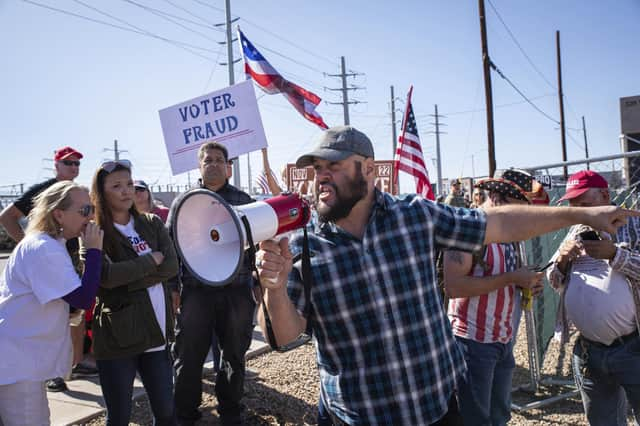John Coulter: Lessons the Irish peace process can teach America


Watching the past policing events and recent elections in the United States as well as the Capitol Hill showdown unfold in the global media were reminiscent of the problems we faced in Northern Ireland in the lead-up to and during the Troubles. That bubbling vitriol was still evident in the American midterms.
The scenes surrounding the death of George Floyd and rioting aftermath in Minneapolis, Minnesota in May 2020 and the January 2021 confrontation on Capitol Hill were reflections of the rioting in Northern Ireland in the late Sixties.
Advertisement
Hide AdAdvertisement
Hide AdIn both scenarios - Northern Ireland in 1969 and America in 2020 and 2021 - the make-up, actions of, and attacks on the police and other institutions reflected the divisions in society.


Policing is a pivotal issue to healing. In Northern Ireland, we had the reform of policing which has worked incredibly well, albeit forced on the pro-Union community.
In the United States, we’ve seen calls to defund policing. What they really need is investment in community policing.
This has been the key to successful policing policy in Northern Ireland. The community needed a police force it can trust to be impartial.
Advertisement
Hide AdAdvertisement
Hide AdEducation is also at the core to the healing process, too. For decades, the way children have been educated has reflected and reinforced division of communities in Northern Ireland. Mind you, the Catholic and state grammar sectors have consistently turned out an impressive array of talented students over the decades, sparking the maxim - if it ain’t broken, why fix it?
In recent decades, the integrated education sector has begun to change things, or is it merely re-inventing the wheel? There is also the tremendous work being done in terms of integration in Northern Ireland’s further and higher education sectors.
While the United States does not have Democrat or Republican schools, across the country there are instances where people have stopped talking to each other; people are afraid of each other.
As President Joe Biden is quoted as saying, there are ‘no blue or red states; we have the United States of America’. Maybe the past events on Capitol Hill and the repercussions of the midterms may cause him to rethink that observation.
Advertisement
Hide AdAdvertisement
Hide AdJust as we’ve learned in Northern Ireland, there can be no quick fix to bringing people together, whatever their age and background, but with persistence, it is possible.
In this respect, it’s not just politicians who need to talk - communities need to engage with each other through workable initiatives. Beyond the institutions, on the ground, community-oriented organisations, such as Corrymeela in north Antrim, Hope For Youth NI, and interface groups where Catholic and Protestant families are living side by side, have played an invaluable role in laying the foundations for bringing groups of different religious and other backgrounds together.
The International Fund for Ireland has been crucial in financing highly successful cross-community projects. Supported through the Fund’s Personal Youth Development Programme, these projects have provided opportunities to build resilience and self-confidence and improve education and employment prospects.
In the United States, there have been similar Cross-Center Initiatives by the Urban Institute to help various communities gain a better understanding of the challenges they face.
Advertisement
Hide AdAdvertisement
Hide AdWhile recognising that the causes of the United States and Northern Ireland conflicts are very different, we can only look to the future, not the past.
Legacy issues will be important, but both nations can only move forward if reconciliation is taken seriously rather than reduced to mere well-meaning speeches; there has to be a willingness by all partners in a conflict to work together.
Paying lip service to reconciliation will only result in the conflict boiling over again in later years. Biden needs to recognise that Trumpism did not disappear in the midterms, just as the American Republican Right-wing needs to remember there is still a Democratic President in the White House.
My late father, Rev Dr Robert Coulter MBE, was an Ulster Unionist Party Member of the Legislative Assembly (MLA) at Stormont for the constituency of North Antrim between 1998 and 2011. He attended a trip to South Africa during the early years of the fledgling Northern Ireland Assembly and met President Nelson Mandela for tea in his home.
Advertisement
Hide AdAdvertisement
Hide AdChatting to dad upon his return, it was clear from his conversation with President Mandela that the ability of all the sides in any debate to talk reconciliation is the key to any peace process. It is no use simply saying there is a need for healing; the various sides have to want healing.
In spite of the historical links between Northern Ireland and the United States, the reconciliation and healing situations in both nations are different, of course. But both to reconcile differences and to move on from the past, we can all heed this message, policy-makers in NI and the US alike - reconciliation must involve personal pro-active dialogue, not passive speech writing. If we want a better future, we’re going to have to want it. And work for it.
l Dr John Coulter has been a journalist since 1978, including with this newspaper.